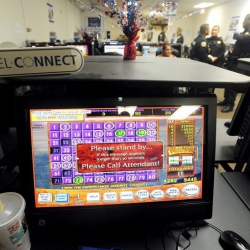Phoenix police raided two illegal gambling businesses this weekend, culminating a 17-month investigation. One of the businesses raided had generated $2 million in revenues since June 2015.
To investigate the illegal gaming operations, officials from the Arizona Department of Gaming infiltrated the businesses, which are a type of business known as a “sweepstakes internet cafe“, which are banned in Arizona.
Sweepstakes cafes began to appear in southern states sometime around 2005. Since then, similar businesses have expanded out of the deep south and likely exist in all US states now.
The Wall Street Journal reported in 2012 that over 20 US states have laws against sweepstakes cafes which host such gambling, but the number of state legislatures taking notice of such activities is likely to grow.
Sweepstakes Cafes
Sweepstakes cafes have computer-style casino games which are hard to spot. Such cafes often are found in stripmalls, shopping areas, and business strips, where they look like a standard non-gaming cyber-cafe. The computers provide access to illegal casino style games, which often have a similarity to slot machines.
The owners of the operations have been identified as 39-year old Joshua Wayne and 39-year old Ferrah Haydok. Mr. Wayne and Ms. Haydok were arrested along with two other individuals on November 16. The arrests came after the police raided several of the pairs’ business locations.
Charges for Joshuan Melton and Ferrah Haydok
Joshua Melton and Ferrah Haydok have been charges with promotion of gambling, illegal control of an enterprise, and money laundering. The operation made roughly $10,000 a week, often with bets made through gambling at legitimate casinos, presumably to launder the money.
In comparison to other illegal gambling operations which have been busted in the Phoenix are over the past few years, that turnover is significant. Because their operations stretched over several sites, Melton and Haydok were operating more like an organized crime ring than a simple illegal gambling operator.
The June 2015 Netclix Case
This is not the first such raid in the area. Police in Maricopa County arrested a 28-year old Phoenix man, Bradley John Babinski Jr., for operating an illegal sweepstakes cafe called Netclix (not Netflix).
In the case of Netclix, Mr. Babinski had ample warning that legal trouble was set to occur. On June 10, 2015, agents of the Arizona Department of Gaming visited Netclix and told him they wanted him to shut down the business. On three separate later occasions, they visited the business, only to find he was still operating his sweepstakes cafe in violation of their directive.
On their fifth visit to his store, the law enforcement officials arrested him on June 24, two weeks after their first visit to the sweepstakes cafe. Perhaps because the example of John Babinski did not make an impact on operators like Joshua Melton and Ferrah Haydok, they were given no such warning.
Poker Union Raids in August 2016
Other banned forms of gambling have been raided, too. On August 15, 2016, three men were arrested in the so-called Poker Union raids. Esho Odisho, 31, Ashour Hermez Odisho, 45, and Bruce Lord, 46, were arrested in Maricopa County for running an illegal poker room called the Poker Union.
On August 26, two more people — Jeremy Ramon Muniz, 29, and Bethany Graham, 26 — were arrested for their role in the Poker Union operation. The two appeared to act as door security or spotters for the card room.
Cyber-Cafes and the Law
Cyber-cafes have a long and complicated history with American law enforcement. In dozens of US states, these gaming operators engage in a cat-and-mouse game with local authorities.
The shops open up and make a profit for a time. Local and state authorities move to ban gaming in the cyber-cafes, then shut them down. The cyber-cafe owners find some new legal loophole to allow the gaming to recommence, or otherwise use lawyers or lobbyists to keep the games going. Once again, legislators and law enforcement officials find some new means to ban such gaming, and the game continues.
Occasionally, those involved either ignore the latest iteration of the sweepstakes cafe law, or they go too far. In the case of the latest Phoenix sweepstakes cafe arrests, the latter might be the case. Making a bit of money on the side is likely to raise eyebrows, but making $2 million off a wide network of such shops is likely to incur official probes.

